- Home
- Andrew McGahan
The War of the Four Isles Page 5
The War of the Four Isles Read online
Page 5
‘We head for home,’ said Fletcher. ‘It’s a packet of news, no mistake; fleet headquarters will want to hear it all as soon as possible. We’ll cut our patrol short and turn north immediately.’
Cassandra had been staring at the door after the departed prisoner, her eyes out of focus; now her gaze came alert with abrupt decision. ‘Captain,’ she said firmly, ‘we can’t go home.’
Fletcher studied her. ‘What?’
‘The Anvil and the Finback may return to Red Island if they wish,’ the laundress continued calmly. ‘But we must go west.’
‘West? You mean . . .’
‘Yes. This is a matter too senior for fleet headquarters. We must report with all speed to the Great Atoll, and to the War Master himself.’
The others all stared at her. Agatha Harp was frowning. ‘You demand we go to Black Sands? But you know better than anyone that no captain may enter the Labyrinth without explicit orders.’
Cassandra simply said, ‘The captain is ordered to enter. I’m ordering it.’
‘You?’ scorned the first officer. ‘Captain, I know she’s a laundress, but after all, she was only put here by her mistresses to watch over their precious toy. She has no authority over the ship, surely.’
Jake Tooth laughed. ‘Precious toy – do you hear? That means you, Mr Amber.’
Fletcher raised a hand, silencing the harpooner, and also the protest on Dow’s lips. (A toy! What in the deeps was that supposed to mean?)
‘So it’s as urgent as all that,’ the captain remarked quietly. ‘This talk of a failed coup among the Ship Kings is not just talk then?’
‘All I can say,’ Cassandra replied, ‘is that the sergeant must be taken to speak before the highest authority. And as you know, I’m empowered, in such a case, to issue direct commands to you.’
‘Even though it means a death sentence for the fellow?’ pressed Fletcher. ‘Once he has seen Black Sands, he will not be suffered to live.’
‘Transfer the other prisoners to the Finback or the Anvil, if it worries you. But the sergeant comes with us, whether he lives or he doesn’t.’
Dow was watching in astonishment. This was a Cassandra he’d never seen.
‘Captain?’ queried Agatha Harp.
Fletcher was staring out to the glare of the afternoon. At length he inhaled a breath, then released it with a puff. ‘Agatha,’ he said, ‘see to the transfer of the other prisoners, then set a course dead west. It looks like we’re destined for the Labyrinth.’ He fixed Cassandra with a baleful stare. ‘And may the monsters of the deep take you, woman, if the damn War Master decides never to let us out again.’
3. THE SECRET OF THE REEFS
For a week the Snout sailed towards the setting sun and the hidden shipyards, and in that time Dow came to a decision. For two and half years now he had waited patiently, he had listened dutifully to the advice of his Twin Island hosts, putting his own desires to the side; but no more. Regardless of what he’d promised Cassandra, his restraint was at an end.
The time had come to act.
It was the news about Nell that had changed everything. Having gone so long without thinking about her, now he could not get the scapegoat out of his mind. An image nagged at him constantly: Nell imprisoned on Banishment, locked away in a tiny cell, no, a mere box, too cramped even to move, her slender frame – so full of fierceness and energy – bound and bent, starving, in pain. If she was even still alive – they’d shot her! And all because she had dared to defy the overlords of her own people.
That defiance was the thing that really gnawed at Dow. It was evident to him now that Nell had spent these last years fighting a far more important war than he had. Yes, he had seen his share of action, he was no coward, he knew that; but in the greater balance of the conflict his own part had been trivial.
Nell, on the other hand, had apparently been working towards an overthrow of the entire Ship Kings regime and an end to the war!
But what had actually happened to her? Dow needed to know the full details. No doubt the marine sergeant would have willingly obliged – for mockery’s sake, if for no other reason – but he was chained in the brig, forbidden communication with anyone other than Cassandra, by captain’s order.
So Dow turned to Cassandra herself. It was clear that she and her mistresses knew something at least of what had been transpiring in the Kingdoms – and as Dow’s daily reading lessons with the laundress had now resumed, he made use of them to press her for information.
At first, Cassandra would say little; after all, she had refused to discuss the subject even with Captain Fletcher. But Dow kept probing, day by day as they drew nearer to the Labyrinth, and eventually Cassandra seemed to understand that he was driven by more than idle curiosity.
‘This Ignella,’ she said at last. ‘The tales tell that you and she discovered the Pole together, and that she stood trial with you later, in front of the Sea Lords. I knew that such things must have forged a friendship between the two of you. But I see now that it’s more than that. And yet I’ve never heard you speak of her yourself.’
It was an observation that raised complex emotions in Dow. How to answer it? Especially when he and Cassandra had themselves almost crossed the boundary of friendship only a few days earlier – and when Dow still wanted to cross it, truth be told. Except he couldn’t, not now; it would be too strange. Indeed, he’d been careful, in these last couple of lessons, to keep a certain distance from the laundress. Had she noticed? Did she guess what it meant? Dow wasn’t even sure himself; all he knew was that with Nell in his thoughts there did not seem to be room for Cassandra. And yet what claim did Nell truly have on him, after so long, and from so far away – when Cassandra was right here?
‘In some ways we hardly knew each other,’ he said finally, ‘but yes, we did those things together. And I have to know what’s happened to her. I owe her that much.’ For nearly forgetting her, if nothing else. ‘There must be something you can tell me.’
Cassandra frowned a moment longer, then sighed. ‘I’m defying my mistresses in speaking at all, but very well, I will tell you this much of events.
‘We’ve long known, from prisoners and the like, that there is division among the Ship Kings. You witnessed this yourself on the Twelfth Kingdom, when old Ibanez was overthrown on the war’s eve. Not all the Kingdoms were eager to pledge loyalty to the new Sea Lords, Emmanuel and Henrietta, for of course they are merely the puppets of the kings Carrasco and Ferdinand, of Valdez and Castille.
‘Those divisions were papered over for a time once the war began, but as the fighting dragged on, the rifts emerged once more. The minor kingdoms, led by King Benito of Valignano, have increasingly come to question the leadership of Valdez and Castille – and to argue that the war is a futile exercise. Indeed, that it is unwinnable, and that the Ship Kings should instead offer the Twin Isles a peace settlement.
‘Valdez and Castille will not hear of this. They are bent on total victory. But the peace faction has grown and grown. By spring of this year Benito had been joined by the sovereigns of four other kingdoms – the Heretic Kings, as the sergeant named them – and also by many princes and nobles from even the loyalist kingdoms. In short, the Heretics had become legitimate rivals for power among the Ship Kings, and looked very likely to overthrow the puppet Sea Lords and their masters.
‘Obviously, this was of great interest to we Twin Islanders. And yes, there has even been secret communication between the War Master and the Heretic Kings, discussing arrangements for a truce, should the Heretics gain control in the Kingdoms. But since midsummer concern has been rising among my superiors, for messages from the Heretics suddenly ceased, and have not resumed.’
Dow stared in realisation. ‘And now you know why, from what the sergeant said.’
Cassandra nodded. ‘I’ve been talking with him these last few days, and if what he claims is true, then there has been a brief but violent civil war in the Kingdoms, and the peace faction has been defeated; the loya
list forces of Castille and Valdez moved unexpectedly, and with treachery it seems, and caught the Heretics off guard. Now they are imprisoned, all five kings, and with them at least a hundred high nobles and princes. Which is bleak news for those who would hope for peace, for now only those Ship Kings committed to total war remain.’
‘And Nell?’
‘Yes, your Nell.’ She considered him intently a moment. ‘It’s strange, this Ship Kings concept of scapegoats. We have no such notion in the Twin Isles, and little do I understand the philosophy of it. But it appears that your Nell has become the scapegoat in effect for the entire Heretic movement; its most famous name and face, and the most hated by the Ship Kings loyalists. But she has been beyond their reach. After escaping in your company from the burning of the Twelfth Kingdom, she fled to Valignano and the protection of King Benito – and has been at his side ever since, speaking out against the puppet Sea Lords and against Carrasco and Ferdinand.’
So that’s how it was. It was not that causes could really have scapegoats, Dow knew, only ships could; but Carrasco and Ferdinand had gone out of their way to brand Nell a traitor – and worse – at their counterfeit trial. It was only fitting then that she had in turn become the symbol of those who would oppose them.
And, ah . . . he could just imagine her, bright with anger and determination. A wave of memory rushed over him; her face, her voice – followed again by guilt, and then dread, for her resistance was at an end.
He said, ‘And now they are captured and imprisoned.’ He studied Cassandra grimly. ‘Why not simply execute them all?’
She shrugged. ‘Our prisoner could only tell me so much, he’s not privy to the high policies of Castille or Valdez. But I think they do not dare. The Kingdoms remain on a knife edge of discontent even if the Heretics are beaten for now: were the loyalists to execute kings, the outrage might cause rebellion to break out afresh. I suspect that Banishment is an expedient, so that Castille and Valdez can appear merciful to the defeated, and thereby dampen further protest.’
‘Banishment,’ Dow meditated, savouring the word uneasily, for the prison isle was famed and feared all throughout the world. ‘What do you and your mistresses know of it?’
Cassandra shook her head. ‘Little, other than that it’s a place terrible in legend – and yet legend is all we have, for no one has ever returned from Banishment to tell of it. Few have even beheld it from afar, for it is isolated beyond sight of any other land, and all approaches to it are hedged by natural barriers unnavigable to ships, or guarded ceaselessly.’ Her gaze fell. ‘I’m sorry, Dow. It’s an evil fate for your friend, and for those banished with her. But there’s nothing we can do about it, and there’s nothing more I can tell you. Shall we return to our reading?’
But Dow had lost interest in reading. He called an end to the lesson and went off, preoccupied – having learned what he’d wanted to learn, but only more convinced because of it that action was needed, and urgently.
For a time, as he stood his watch that night and then tried to sleep the next morning in his cabin, he entertained wild fantasies of rushing alone to Nell’s rescue. He didn’t know exactly what place she held in his heart anymore, but he couldn’t accept the assertion that there was nothing he could do to help her. Instead, he imagined himself sailing boldly across the Middle Sea in a small, swift boat, to the shores of Banishment itself, where he would break into the great prison somehow and set her free . . .
But of course that was nonsense. He could never voyage so far single-handed. Banishment was on the other side of the world! He would need a ship, not a boat, just to get near to the isle.
Very well then – he forced himself to think more soberly – he must secure a ship, and a crew to sail it. But from where? There was only one option: the Twin Islanders. They had ships aplenty, no doubt – but why should they loan him one, to risk on a voyage so perilous? There was no good reason. What was Nell to them? Nothing. Her Heretic cause had failed; she was irrelevant to them otherwise.
But then the answer came to him in a flash, a possibility so bright it made Dow sit bolt upright in his bed: what if her cause hadn’t failed?
The solution glowed there before him, tantalising. He almost leapt from bed to go immediately and tell Cassandra about it. But no. He didn’t have it all yet. There was still the actual landing upon to Banishment to consider. Even with a ship, the prison isle’s notorious defences had never been breached. For the moment, Dow had no answer to that.
So he would say nothing for now. He would hug his proposal to his chest like a jewel, polishing it, and trying to solve its last riddles, in preparation for the hour when he must plead his case.
There was time, after all.
It would be several days yet before the Snout reached the Great Atoll.
*
The Ship Kings, in the long ago Great Age of Exploration, had discovered, not far to the south of the Twin Isles, a vast zone of reefs and shallows. They had named the region the Labyrinth Corridors, for it was a maze beyond unravelling, a thousand miles across. Oh, they had made many attempts to penetrate its mysteries, but in vain, and after losing many ships within its treacherous and winding ways, all without sighting any land or anything else of worth, they had declared the whole area unfit for human endeavour, and forgotten it. It was in any case a dreadful realm of heat and biting insects and fever.
In the five hundred years since, the Ship Kings had scarcely given the Corridors a second thought. But in fact they had given up the search too soon, for at the Labyrinth’s stifling heart there lay one unimaginable treasure.
The Great Atoll.
Dow had never been there, nor had the majority of the Snout’s crew, for it was a forbidden place even to most Twin Islanders. But after seven days of westward sailing, and under yet another cloudless and blazing sky, the Snout sighted a first outlying reef, and all knew that the Labyrinth Corridors were drawing nigh.
The shoal lay palely awash, a long green shadow topped with white foam. Alone there amid all the ocean it gave little clue of what lay beyond – but after only a few miles more they came upon another reef, and then another beyond that. Soon the sea was scattered with reefs, dotted across a shallow and sandy ocean floor.
They had entered the outer Corridors. Over the next two days the shoals grew ever more crowded together, but the Snout pressed on westward, creeping cautiously between them. Already they would have been lost amid the channels were it not for the charts Captain Fletcher brought forth from a locked cupboard in his cabin; secret maps of the outer maze. The Ship Kings would have given much to see such maps, but even these charts did not show the complete way through the Labyrinth. They led only to the entrance of the inner Corridors; the one true entrance, among a thousand false ones. This was Pilot Reef, which hove into view on the third morning, emerging from a horizon white with heat.
It was a speck of land only, a mere sandbank anchored to a low, stony prominence. In any other part of the ocean, or at any other time in history, an isle so waterless and barren would have been declared uninhabitable, and left nameless and unvisited, save by chance or by wreck. But now – amid war and rebellion – there stood upon the crest of the rock a small fortress, no bigger than a house, but crafted soundly from stone, so as to withstand even the heaviest shot from the largest of any battleship’s cannon. For it was this tiny fortress that marked and defended the only pathway into the Labyrinth’s heart.
How the Ship Kings sought such a path! But always they failed. From the south it was impossible even to approach the Labyrinth, for there the Corridors merged with the Barrier Doldrums, an even deadlier zone. From the north and west any attempt was just as futile, for though many paths appeared to lead inwards, all came only to dead ends. From the east alone could the Labyrinth be entered, but even should the Ship Kings one day unpick the outer Corridors, they would merely arrive at Pilot Reef, and find the final doorway locked against them.
Dow studied the fortress as they drew closer. It was not
a pretty locale, nor, he imagined, a comfortable one for its inhabitants. The keep had only a few narrow gun slits for ventilation. It would be insufferably hot inside, and as all water had to be brought in by hand, bathing would be out of the question, and even the most raging thirst could scarce be quenched.
Little wonder then that the pilots who lived here were renowned for their hardiness. But there was no sign of anyone for the moment; no face appeared at the gun slits, no flag of welcome was raised. The Snout was an unscheduled, unexpected ship; their very arrival in this manner was by strict definition a criminal act.
They anchored a hundred or so yards off the Reef’s naked shore, then Captain Fletcher produced a book of secret codes. Consulting it, the signaller made a series of gestures with his coloured flags, and eventually, in minimal acknowledgement, a single black pennant ran up the fort’s flagpole.
It meant wait.
They did so. In a quarter hour, presumably after shipping lists had been consulted and the Snout identified, a small door opened in the keep, and two men emerged. They descended to a dock where several skiffs were berthed, and launching one, rowed out to the Snout. But they paused some dozen yards off, ignoring the boarding ladder lowered for them.
‘Captain of the Snout,’ one of the men called, his tone none too friendly, ‘why come you here, unauthorised and unannounced?’
Captain Fletcher, at the high deck rail, gave an aggrieved sniff, then bellowed back, ‘It wasn’t my idea!’ He nodded stiffly towards Cassandra, who was at the rail with him. ‘Ask her. I’m only the captain.’
The man turned a bald, sunburned head to Cassandra. ‘You’re a laundress?’
‘I am. And I invoke the thirtieth clause of association between our two Orders, and demand admission to the Labyrinth under its terms.’

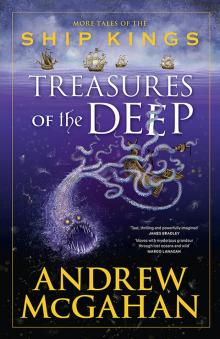 Treasures of the Deep
Treasures of the Deep The Rich Man’s House
The Rich Man’s House Praise
Praise The White Earth
The White Earth 1988
1988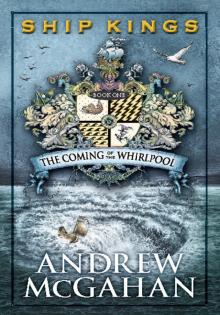 The Coming of the Whirlpool
The Coming of the Whirlpool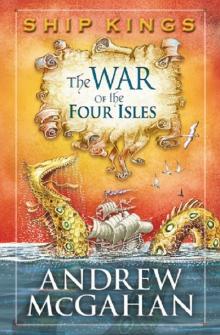 The War of the Four Isles
The War of the Four Isles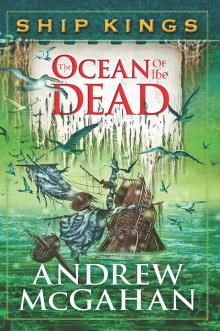 The Ocean of the Dead: Ship Kings 4
The Ocean of the Dead: Ship Kings 4 Last Drinks
Last Drinks Wonders of a Godless World
Wonders of a Godless World Underground
Underground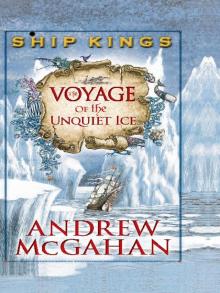 The Voyage of the Unquiet Ice
The Voyage of the Unquiet Ice